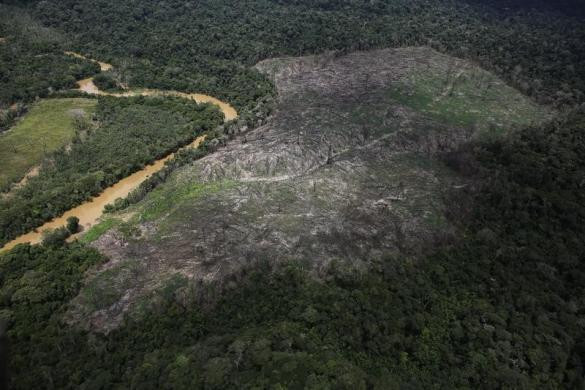Amazon rainforest could become 'hotspot for new global pandemic diseases' if deforestation persists
As per the data, there was an increase of 85 percent of deforestation in the tropical rainforest last year.
While coronavirus pandemic is far from over, an environmental expert is already talking about another one that may originate from the Amazon forest. According to a Brazilian scientist if rampant deforestation continues in Amazonia there is a chance of emergence of zoonotic diseases and global pandemics.
Speaking with AFP, David Lapola an ecologist who studies the impact of human activity on the future ecosystem of forests, said Amazon is a "huge reservoir of viruses." Deforestation and urbanisation of such wild areas can lead to more outbreaks passed from animals to humans. It is believed that intrusion of humanity in wild animal's habitat due to widespread deforestation could be one of the reasons for the coronavirus outbreak. The severe respiratory illness COVID-19 is believed to have passed from bats to humans as an impact of the rapid urbanisation of Hubei province in China.
"Amazon is a huge reservoir of viruses. We'd better not try our luck," Lapola said in the interview.
Also referred to as Amazon Jungle, this tropical rainforest is the largest in the world spread across of 2,700,000 sq m, covering the territory belonging to nine nations in South America. It is the most biodiverse region on the earth providing shelter to millions of species of flora and fauna. The billions of trees in the jungle are said to be a large contributor to slowing down climate change on our planet by producing up to 20 percent of oxygen. Therefore, it is often referred to as the "Lungs of Earth."
Last year, deforestation in the Brazilian jungles increased by 85 percent impacting 3,900 square miles. If the trend continues, it is believed that we will not only end displacing the animals from their natural habitat but also lead to the rise in zoonotic diseases. As per the data by Brazil's National Space Research Institute (INPE), this year, from January to April, the area of the rainforest was reduced by 1,202 square kilometers.
Lapola, who works at the University of Campinas in Brazil, human health is bound to take a toll if we continue to disrupt the ecological system.
"When you create ecological disequilibrium... that's when a virus can jump" from animals to humans, he said.
As per the report, a similar pattern was observed with HIV, Ebola, and dengue fever, the diseases that are caused by "viruses that emerged or spread on a huge scale because of ecological imbalances."

He warns the authorities against using Amazon irrationally as it is host to "immense biodiversity" that could possibly lead to huge outbreaks. "That's one more reason not to use the Amazon irrationally like we're doing now," he said.
© Copyright IBTimes 2025. All rights reserved.





















